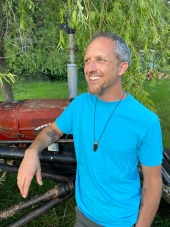
 8
8




 3
3




 3
3




 1
1




Chris Lynn wrote:How can we get around our programming of always being "PC," and start talking to each other with trust, patience, and an objective spirit?
I wanted to start a topic about Social Permaculture, and how we can learn to communicate in a healthy, practical way.
Chris Lynn wrote:The most difficult part of living together that I have observed, in any scenario, is improper communication. in the United States especially, through a mixture of rapidly advancing social technology, and social norms causing fear of rejection, insecurities, and general social anxiety, I notice a difficulty in humans being able to express their emotions without fearing they will make a fool of themselves. I also notice people tend to immediately respond defensively when facing criticism.
In my society, we don't need to depend on personal relationships anymore for obtaining food, living necessities, entertainment, or, really, anything. You can get a lot (maybe most) of what you need and want without having any friends/family, merely by pushing the right buttons and being a cog in the workforce machine.Chris Lynn wrote:I believe this has to do with personal insecurities brought on by unhealthy social environments, and, primarily, the struggle many Westerners have with listening properly.
People aren't used to being heard in this culture, I think, because they don't even listen to themselves. It's noisy these days, 24/7. We need more silence in our lives to each listen to our own inner voice and converse with it, and we will be better able to both talk well and listen well to others.Chris Lynn wrote:I heard someone put it like this, once. Most people are either talking, or waiting for someone else to finish talking, so they can return to talking themselves.
“If we are honest, we can still love what we are, we can find all the good there is to find, and we may find ways to enhance that good, and to find a new kind of living world which is appropriate for our time.” ― Christopher Alexander
 1
1




 4
4








Chris Lynn wrote:How can we get around our programming of always being "PC," and start talking to each other with trust, patience, and an objective spirit?
I wanted to start a topic about Social Permaculture, and how we can learn to communicate in a healthy, practical way. ...
I heard someone put it like this, once. Most people are either talking, or waiting for someone else to finish talking, so they can return to talking themselves.
Rachel said," where humans finally figure this communication thing out. I doubt that we ever will, mostly because of the variations in human personality and personal backgrounds.

Invasive plants are Earth's way of insisting we notice her medicines. Stephen Herrod Buhner
Everyone learns what works by learning what doesn't work. Stephen Herrod Buhner
 3
3








 1
1




Tim Lutz wrote: I get to engage in expedited team driving with strangers 24 hours a day for week trips of planned chaos.


Invasive plants are Earth's way of insisting we notice her medicines. Stephen Herrod Buhner
Everyone learns what works by learning what doesn't work. Stephen Herrod Buhner
 5
5




Ashley Colby, PhD
Rizomafieldschool.com
https://app.gumroad.com/rizomaschool
 5
5




 3
3




"Also, just as you want men to do to you, do the same way to them" (Luke 6:31)
 3
3




Ashley Colby wrote:It's not a surprise that many intentional communities fail and many that succeed can often have hierarchical social order that determines who gets to decide what.
Bees love me, fish fear me.
 1
1




 1
1




Charlie Tioli wrote:Thank you for this topic!
Listening is a great place to start. Sometimes, especially with Complex trauma (C-PTSD is quite different from PTSD), listening is not available due to being checked out from or running from connecting with self and others. We don't know we're doing this when we're doing this. From the outside, it just looks like someone is dreamy, spacey, not listening, disengaged, workaholic, or addicted to something.






 1
1




Margaux Knox wrote:
Ashley Colby wrote:It's not a surprise that many intentional communities fail and many that succeed can often have hierarchical social order that determines who gets to decide what.
This is interesting! I wonder if you have any anecdotes you can share about this?
I used to be involved with a collective that tried to be non-hierarchical, but we kept having problems. I always said it was because people were so used to hierarchy that they would create it where there was none, and push against it, creating conflict. In the end, it became clear to me that nothing would get done unless somebody took charge. That was hard for me, because I believed so strongly in the lack of hierarchy, and it seemed the responsibility to take charge was pushed to me.
...
"Also, just as you want men to do to you, do the same way to them" (Luke 6:31)

| I agree. Here's the link: http://stoves2.com |






